|
|
|
Sort Order |
|
|
|
Items / Page
|
|
|
|
|
|
|
| Srl | Item |
| 1 |
ID:
178914
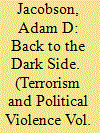

|
|
|
|
|
| Summary/Abstract |
Since the CIA’s inception, elements of the Agency have researched, used, and taught interrogation tactics for national security and counterterrorism purposes. These have sometimes constituted torture, cruel, inhuman, or degrading treatment, and ethical violations. Using the lens of Institutional Change Theory and investigating critical junctures in CIA history, this paper shows that a lack of meaningful internal and external oversight and accountability measures can explain the CIA’s recurrent use and propagation of torture and abuse in interrogation. These findings have implications for future counterterrorism interrogation policy, and preventing the use of ineffective, unethical techniques
|
|
|
|
|
|
|
|
|
|
|
|
|
|
|
|
| 2 |
ID:
154866
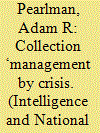

|
|
|
|
|
| Summary/Abstract |
This article examines human intelligence collection in wartime, and offers a methodology to help determine the relative success or failure of the detainee interrogation mission at Guantanamo Bay, Cuba (GTMO). It surveys the relevant background on GTMO, a brief history on interrogations during World War II and Vietnam, and draws comparisons among them to be considered in potential future mass-interrogation missions. Drawing from documentary research and two dozen original interviews, it argues that, to the extent an intelligence mission was one of the purposes of transferring detainees to GTMO, the relevant metric of success is whether collectors were able to obtain more or ‘better’ intelligence from the detainees than they would have been able to in-theater. At the strategic level, then, GTMO’s value to intelligence collectors is to be assessed at the margins, rather than the absolute value of the information educed.
|
|
|
|
|
|
|
|
|
|
|
|
|
|
|
|
| 3 |
ID:
090490
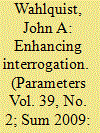

|
|
|
| 4 |
ID:
064702


|
|
|
|
|
| Publication |
Jul-Sep 2005.
|
|
|
|
|
|
|
|
|
|
|
|
|
|
|
|
| 5 |
ID:
098174


|
|
|
| 6 |
ID:
142047
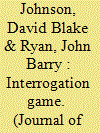

|
|
|
|
|
| Summary/Abstract |
While there is widespread debate about techniques for obtaining information from non-cooperative sources, there is little research concerning the efficacy of different methods. We introduce the ‘Interrogation Game’ as a simple model of the information a source will provide when faced with either (1) an interrogator using coercive techniques or (2) an interrogator offering rewards. The model demonstrates that coercive interrogation results in a very slight increase in accurate information from knowledgeable sources, but much more inaccurate information from ignorant sources. In short, when ignorant group members refuse to provide information, this increases the inequality of payoffs among group members under coercion while the same behavior – truthfully revealing ignorance – decreases the inequality of payoffs under reward. If ignorant detainees have concern for the payoffs of their other group members, they will admit their ignorance in reward, but not coercion. We test the model with a group-based experiment. As the model predicts, coercion leads subjects to provide more inaccurate information. Contrary to the model’s expectations, however, accurate information is almost equally likely in the coercion and reward treatments.
|
|
|
|
|
|
|
|
|
|
|
|
|
|
|
|
| 7 |
ID:
123179


|
|
|
|
|
| Publication |
2013.
|
| Summary/Abstract |
The 9/11 attacks and the subsequent increase of counterterrorism laws and regulations in Western democracies have also spurned heavy debates on torture and ill-treatment of captured terrorist suspects. However, while the Netherlands did deploy troops to Afghanistan and adopted new laws and policies regarding counterterrorism, debates on torture remained marginal. Indeed, the Netherlands has not suffered the pressure of a constant high terrorist threat, or endured a catastrophic terrorist attack. However, the author argues that there are more reasons for the lack of heated discussions. While this article does not intend to lift the Dutch case to an exemplary one, it illustrates how Dutch government authorities made good use of the benefits of hindsight regarding torture debates and incidents elsewhere and were able to apply lessons regarding accountability and oversight concerning interrogation issues at home successfully.
|
|
|
|
|
|
|
|
|
|
|
|
|
|
|
|
| 8 |
ID:
091746


|
|
|
|
|
| Publication |
2009.
|
| Summary/Abstract |
When internment was introduced in Northern Ireland on 9 August 1971, the Stormont and British Governments received immediate criticism for the move from within the United Kingdom and the Republic of Ireland. Condemnation widened as reports of ill-treatment at the hands of the security forces during arrest, whilst in custody and employed in conjunction with interrogation reached the public domain. After arrest prisoners were first questioned by the police to confirm the right person had been arrested and to establish whether they should be questioned with a view to preferring a criminal charge, whether they should be transferred to an interrogation centre for secondary interrogation with the aim of eliciting intelligence, or, if unsuitable for either of these, be released. In addition to secondary interrogation, 14 men were interrogated 'in-depth'.
|
|
|
|
|
|
|
|
|
|
|
|
|
|
|
|
| 9 |
ID:
087457
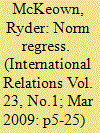

|
|
|
|
|
| Publication |
2009.
|
| Summary/Abstract |
Is the norm against torture suffering a crisis of legitimacy within the United States, and if so, does this constitute a crisis in the norm itself? Can constructivist international relations theory explain how the norm came to be significantly weakened by its most important proponent? Constructivist literature on norms has hitherto suffered from a `nice norm bias' that does not adequately take into account the reversibility of so-called `internalized' norms like the one prohibiting torture. Through an examination of the rhetoric, policies and practices surrounding US interrogation after 9/11, this article addresses omissions in constructivist literature by providing a theoretical model to explain `norm regress', or the death of norms. It claims that the torture norm is suffering a crisis of legitimacy within the United States and any future incidences of torture by liberal states may well bring about a crisis of legitimacy in the international norm itself.
|
|
|
|
|
|
|
|
|
|
|
|
|
|
|
|
| 10 |
ID:
038601


|
|
|
|
|
| Publication |
London, Methuen London Ltd, 1983.
|
| Description |
vii, 158p.Hbk
|
| Standard Number |
0413553000
|
|
|
|
|
|
|
|
|
|
|
|
Copies: C:1/I:0,R:0,Q:0
Circulation
| Accession# | Call# | Current Location | Status | Policy | Location |
| 024837 | 920.932712/HEA 024837 | Main | On Shelf | General | |
|
|
|
|
| 11 |
ID:
146229
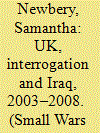

|
|
|
|
|
| Summary/Abstract |
The UK’s interrogation operations during the conflict in Iraq (2003–2008) are often portrayed by the media as involving significant amounts of mistreatment. This article demonstrates that these practices are not necessarily representative of the UK’s interrogation operations across this conflict. In doing so it contributes to the limited literature on the practice of interrogation and on the UK’s combat operations in Iraq. The UK’s interrogation capability, and therefore its intelligence-gathering capability, is shown to have rested primarily with the military’s Joint Forward Interrogation Team (JFIT). The JFIT suffered from limitations to the number, training and experience of its interrogators and interpreters. It is argued that maintaining a permanent, higher level of preparedness for interrogation by the British armed forces is desirable.
|
|
|
|
|
|
|
|
|
|
|
|
|
|
|
|
|
|
|
|
|